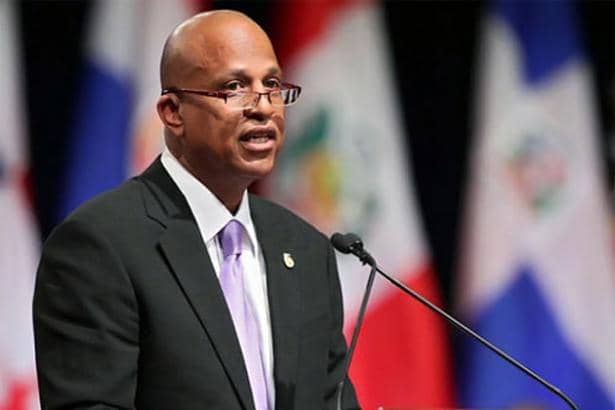
Prime Minister Dean Barrow has presented BDZ$3.03 billion (One Belize dollar=US$0.49 cents) budget to Parliament on Monday saying his administration will not seek to improve the efficiency of revenue collection rather than increase tax rates in the future.
Barrow told legislators that the country’s economy currently challenged by low growth and high levels of public debt and that his government intends to confront these challenges with a fiscal strategy that, over the coming five years, tries to contain public spending and promote private sector growth.
In addition, he said the government will move to make taxes simpler, broader and more equitable as well as “eliminate certain tax privileges and exemptions, with the aim of reducing overall tax rates on the general public.
He said that after carrying out a comprehensive review of the existing tax framework, his administration will make revenue collection more effective and forceful, improve tax compliance, which could increase tax revenues by two percentage points of gross domestic product (GDP) over the coming two years.
“A more equitable and efficient tax system is expected to be supportive of economic growth, and over time increase Government revenue,” Barrow said.
He said regarding expenditure, his administration intends to contain and reduce current expenditures, while at the same time protecting capital expenditures that promote economic growth.
“More specifically, the bill for public wages and consultants shall increase by no more than the expected rate of inflation over the medium term, about two per cent per year,” he said, adding “this implies managing carefully the levels of public sector employment, and limiting the increase in salaries.
“Included under this objective is employment in Government-owned agencies and subsidized employment in the private sector. Priorities within the public sector shall be reviewed, and special emphasis shall be given to security, education and health”.
Barrow said there will be a reduction in transfers and subsidies by BZ$20 million by 2020 and that government-owned agencies will be restructured to be more efficient and rely less on government subsidies.
“Subsidies to privileged private industries will slowly be reduced and phased out to free resources for the poor,” he said, adding that transfers shall be reoriented from industries towards reducing poverty.
“The volume of targeted social programmes shall increase, with specific conditions attached for the beneficiaries, such as undertaking efforts in education, healthcare, and job search.”
He said there would also be a “more aggressive” approach towards debt management so as to reduce debt service, which now amounts to 15 per cent of revenue.
“An example is the shift from bank overdraft to Treasury Bills and Notes, which cut domestic interest payments. Equally, external debt financing shall prioritize concessional loans from multilateral and bilateral sources. This debt shall over time replace the expensive commercial bank debt. If possible, commercial bank debt shall be retired early.”
Barrow said that capital expenditures will not fall below five per cent 5% of GDP.
“While reducing capital expenditures may be easier than reducing current expenditures, it is detrimental to growth. Besides fiscal adjustment, the second pillar of Belize’s Fiscal Strategy is promoting medium-term growth. The Government has also introduced new policies and procedures to ensure that capital expenditures are prioritized and productive via the Growth and Sustainable Development Strategy (GSDS).”
He said that to contain expenditure, enhance expenditure management and achieve the fiscal targets, a number of administrative and public financial management reforms will be introduced.
These include the implementation of a central treasury management system and the establishment of a single treasury account to improve the central Government’s ability to manage scarce financial resources.
The implementation of a strategy to enhance the internal audit functions of the government as well as a commitment control system established in the budget process.
He said there would also be the standardization of bidding documents for public procurement to increase competition and savings in public procurement as well as the establishment of a single beneficiary system to streamline and better target subsidies and transfers to households.
Barrow also said there would be new contracts or hiring of public servants including in statutory bodies and state-owned enterprises, with few exceptions, mainly in education, health and security to respond to population growth.
He said a comprehensive civil service census and design of a civil service rationalization plan, adding there would be parametric pension reform to increase the average retirement age of civil servants and address the issue of contributions to the scheme.
Prime Minister Barrow told legislators that Belize is the third most indebted country in the Caribbean after Jamaica and Barbados and that at 93.8 per cent of 2017 GDP, Belize’s public debt level exceeds thresholds considered safe by international standards set at 60 per cent of GDP.
“Belize’s debt challenge is only recent. Before 2000, Belize followed a conservative fiscal policy and kept debt levels low. A series of expensive policy decisions at the beginning of the last decade trebled the debt ratio within five years.
“The government is fully aware that the current debt level is unsustainable despite the recent restructuring in March 2017, and that prudent fiscal policy is critical to placing public debt on a downward trajectory.
“The agreement with private external creditors in March 2017 reduces the debt service cost of a relatively more expensive portion of the external debt, and the NPV gain is significant. However, for these gains to be lasting, however, the debt restructuring needs to be underpinned by a credible and sustained program of fiscal consolidation, combined with structural reforms to boost growth,” he added.
But in an immediate response, Opposition Leader, John Briceño, said that the budget is “no glitter and no substance, because there’s nothing in that budget; it’s lifeless”.
He said that Prime Minister Barrow has introduced a tax on people including school children using the internet.
“So basically what the Prime Minister is doing now is putting a new tax on the Belizean people, especially the middle class and the lower middle class who are struggling, who are sure now that access to the Internet or data is a necessity,” he added.
Debate on the budget will takes place on March 22 and 23.
Advertise with the mоѕt vіѕіtеd nеwѕ ѕіtе іn Antigua!
We offer fully customizable and flexible digital marketing packages.
Contact us at [email protected]
















